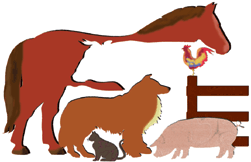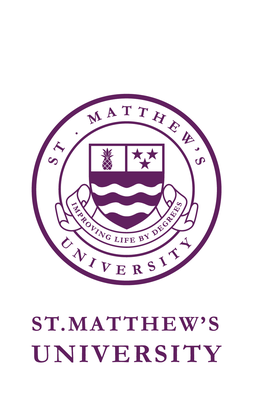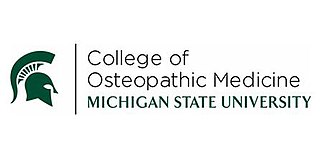
Veterinary medicine is the branch of medicine that deals with the prevention, management, diagnosis, and treatment of disease, disorder, and injury in non-human animals. The scope of veterinary medicine is wide, covering all animal species, both domesticated and wild, with a wide range of conditions that can affect different species.

A veterinarian (vet) is a medical professional who practices veterinary medicine. They manage a wide range of health conditions and injuries in non-human animals. Along with this, veterinarians also play a role in animal reproduction, health management, conservation, husbandry and breeding and preventive medicine like nutrition, vaccination and parasitic control as well as biosecurity and zoonotic disease surveillance and prevention.

The New York State College of Veterinary Medicine at Cornell University is a college of veterinary medicine at Cornell University, in Ithaca, New York. It was founded in 1894. It is the first statutory college of the State University of New York (SUNY) system.
The University of California, Davis, School of Veterinary Medicine is the largest veterinary school in the United States. Established in 1948, the school is the primary health resource for California's animal populations. In 2020, the school was again ranked first in the United States by U.S. News & World Report and in 2022, ranked second in the world by QS World University Rankings. The school is located in the southwest corner of the main campus of the University of California, Davis. The current dean of veterinary medicine is Dr. Mark Stetter.
The Virginia–Maryland College of Veterinary Medicine is the veterinary school Virginia Tech and the University of Maryland, College Park - both of which are public research universities in the Commonwealth of Virginia and the State of Maryland, respectively.The college was created as a joint venture of the two universities and their respective state governments in order to fill the need for veterinary medicine education in both states. Students from both states are considered "in-state" students for admissions and tuition purposes.
The Texas A&M University School of Veterinary Medicine & Biomedical Sciences is the veterinary school of Texas A&M University, a public research university in College Station, Texas. It was founded in 1916 and is one of only 31 colleges or schools of veterinary medicine in the United States and Canada. It is consistently ranked as one of the top 5 veterinary schools in the country, according to U.S. News. The school offers an undergraduate program in Biomedical Sciences, a professional Doctor of Veterinary Medicine program, and numerous graduate programs relating to veterinary medicine and epidemiology.

The Center for Veterinary Medicine (CVM) is a branch of the U.S. Food and Drug Administration (FDA) that regulates the manufacture and distribution of food, food additives, and drugs that will be given to animals. These include animals from which human foods are derived, as well as food additives and drugs for pets or companion animals. CVM is responsible for regulating drugs, devices, and food additives given to, or used on, over one hundred million companion animals, plus millions of poultry, cattle, swine, and minor animal species. Minor animal species include animals other than cattle, swine, chickens, turkeys, horses, dogs, and cats.

Veterinary education is the tertiary education of veterinarians. To become a veterinarian, one must first complete a degree in veterinary medicine Doctor of Veterinary Medicine.

St. Matthew's University (SMU) is a private for-profit offshore medical school located in Grand Cayman, Cayman Islands in the Caribbean. SMU has a School of Medicine and a School of Veterinary Medicine, which confer M.D. and D.V.M. degrees, respectively. St. Matthew's University is owned by R3 Education, Inc.

The Michigan State University College of Human Medicine (MSUCHM) is an academic division of Michigan State University (MSU) that grants the Doctor of Medicine (MD) degree, emphasizing patient-centered care and a biopsychosocial approach to caring for patients. Required courses at the college reinforce the importance of ethics and professionalism in medicine. In 2013, U.S. News & World Report ranked the college 46th for primary care. The college was also ranked for family medicine and rural medicine. More than 4,000 M.D.s have graduated from the college. Pre-clinical campuses are located on MSU's main campus in East Lansing, Michigan and in downtown Grand Rapids, Michigan, while the clinical rotations are at seven community campuses located throughout Michigan.
The University of Georgia College of Veterinary Medicine is a college within the University of Georgia (UGA) in Athens, Georgia, United States and is a top 10 ranked veterinary school.
The Centennial Biomedical Campus is 250 acres (1.0 km2) of property owned and operated by North Carolina State University in Raleigh, North Carolina, United States. It is located five minutes west of the NC State's main campus and is considered part of Centennial Campus, the university's research and educational campus.
North Carolina State University College of Veterinary Medicine is an American educational institution located in Raleigh, North Carolina that offers master's and doctorate-level degree programs; interdisciplinary research in a range of veterinary and comparative medicine topics through centers, institutes, programs and laboratories; and external engagement through public service programs and activities.
The Student American Veterinary Medical Association (SAVMA) is a national association of student chapters of the American Veterinary Medical Association (AVMA) at schools and colleges of veterinary medicine in the United States, Canada and the Caribbean. SAVMA acts as a single national voice for veterinary students in accordance with the policies and goals of the AVMA, coordinates AVMA student chapter activities, facilitates the exchange of information, and represents the interests of student veterinarians within AVMA, the veterinary profession and in the political and legislative arenas nationally.

The University of Florida College of Veterinary Medicine is the veterinary school of the University of Florida in Gainesville, Florida. The college only enrolls professional program D.V.M. students and graduate students pursuing M.S. or Ph.D. degrees. No undergraduates are enrolled in the college.

Veterinary chiropractic, also known as animal chiropractic, is chiropractic for animals – a type of spinal manipulation. Veterinary chiropractors typically treat horses, racing greyhounds, and pets. Veterinary chiropractic is a controversial method due to a lack of evidence as to the efficacy of chiropractic methods. Contrary to traditional medicine, chiropractic therapies are alternative medicine. There is some degree of risk associated with even skilled manipulation in animals as the potential for injury exists with any technique used. The founder of chiropractic, Daniel David Palmer, used the method on animals, partly to challenge claims that the placebo effect was responsible for favorable results in humans. Chiropractic treatment of large animals dates back to the early 1900s. As of 2019, many states in the US provide statutory or regulatory guidelines for the practice of chiropractic and related treatments on animals, generally requiring some form of veterinary involvement.
The College of Veterinary Medicine (CVM) is one of the 11 degree-granting units of the University of the Philippines at Los Baños. It is the country's first veterinary school.

The Michigan State University College of Osteopathic Medicine (MSUCOM) is one of the two public medical schools of Michigan State University, a public land-grant research university in East Lansing, Michigan. The college grants the Doctor of Osteopathic Medicine (D.O.) degree, as well as a DO-PhD combined degree for students interested in training as physician-scientists. MSUCOM operates two satellite campuses in Clinton Township and Detroit. The college is accredited by the American Osteopathic Association's Commission on Osteopathic College Accreditation (COCA) and by the Higher Learning Commission.

The Western University College of Veterinary Medicine is a non-profit, private, veterinary medical school at Western University of Health Sciences located in Pomona, in the US state of California. The college consists of about 400 veterinary medical students, and confers the degree Doctor of Veterinary Medicine. The college was established in 1998 as the first veterinary school to open in the country in 20 years. The college is fully accredited by the American Veterinary Medical Association.

Amy K. LeBlanc is an American veterinary oncologist and biologist researching animal modeling for development of new cancer drugs and imaging agents, and identification of imaging biomarkers, development and optimization of PET imaging hardware and imaging protocols. She is a senior scientist in the molecular imaging program and director of the Comparative Oncology Program at the National Cancer Institute. LeBlanc was previously an associate professor at the University of Tennessee College of Medicine and College of Veterinary Medicine.












